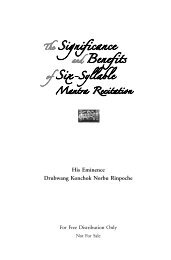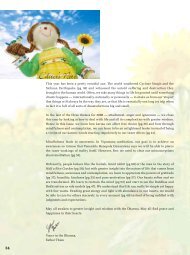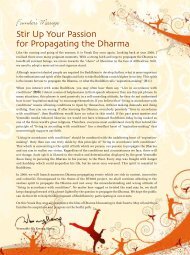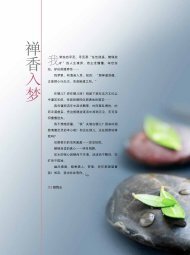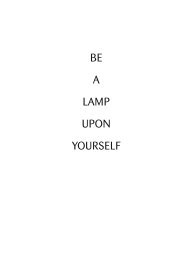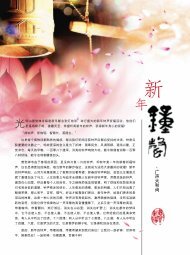Editor's Note - Dharma Resources - Kong Meng San Phor Kark See ...
Editor's Note - Dharma Resources - Kong Meng San Phor Kark See ...
Editor's Note - Dharma Resources - Kong Meng San Phor Kark See ...
You also want an ePaper? Increase the reach of your titles
YUMPU automatically turns print PDFs into web optimized ePapers that Google loves.
harness wisdom so as to abandon delusion with<br />
the strength of concentration. For instance, by<br />
contemplating on impurity, we could defuse greed.<br />
Zen meditation bestows many other advantages too.<br />
According to Master Sheng Yen, Zen meditation<br />
bestows three benefits. Firstly, it builds a strong<br />
and healthy body; secondly, an active brain; and<br />
thirdly a purified personality. The first two could be<br />
considered body wealth while the third is termed as<br />
<strong>Dharma</strong> wealth.<br />
The Buddha had always reiterated the importance<br />
of human life. In the six realms, only humans have<br />
the capability to cultivate <strong>Dharma</strong>. It is for the same<br />
reason that Master Yin Shun advocated “Humanistic<br />
Buddhism” ( 人 间 佛 教 ). In the book, Zen Buddhism<br />
In the 20th Century, Heinrich Dumoulin explained:<br />
“Zen meditation can be of therapeutic value both<br />
to the healthy and to those afflicted with bodily or<br />
mental aliments. No one is so healthy that his or her<br />
psychosomatic condition is completely undamaged.”<br />
Clearly, this statement explicitly defines the function<br />
of Zen meditation. At this point, we could say that<br />
Heinrich Dumoulin held the same view as Master<br />
Sheng Yen.<br />
such as career, family, friends, voluntary work etc. In<br />
turn, this produces a negative impact on Buddhism.<br />
Such practice not only gives no benefit, at the same<br />
time it gives Buddhism a bad name. Thus, finding<br />
the right Zen meditation instructor is an important<br />
mission. He would possess the right attitude,<br />
pure motivation and the necessary experience to<br />
facilitate us in diminishing our problems which is<br />
indispensable for Zen meditation.<br />
Inseparable from daily life<br />
In the book, The Essence of Zen, Sekkei Harada<br />
enlightened: “Zazen can broadly be divided in two:<br />
Zen within activity and Zen within stillness. Zen<br />
within activity embraces the other activities in our<br />
daily life, such as our work and so forth. Zen within<br />
stillness is what we do in the zendo, the meditation<br />
hall.” Obviously, he was trying to convey the right<br />
message for the daily practice of Zen. <strong>Dharma</strong><br />
cannot be separated and isolated from our daily life.<br />
Since Zen could be epitomised as wisdom, truth or<br />
<strong>Dharma</strong>, then it would be logical to say that Zen is<br />
an intimate part of our life. We should practise it<br />
diligently in all our daily activities. This is precisely<br />
what the Zen master meant by the “Zen in life”( 生 活<br />
禅 ).<br />
Right motivation & moderation<br />
Zen meditation is gaining popularity everywhere.<br />
Many people practise it for various reasons. These<br />
reasons could range from curiosity, for relaxation,<br />
health and stress relief purposes to practising it<br />
with the aim of acquiring spiritual powers or to<br />
witness sages such as Buddha or Bodhisattva during<br />
meditation.<br />
Practising it solely for the purpose of good health<br />
could be achieved by controlling one’s breath. One<br />
does not induce oneself in any religious aspect in<br />
such practice. However, if the objective for practising<br />
the meditation is out of curiosity or to acquire<br />
spiritual powers, then it would not be acceptable<br />
from Buddhism’s point of view.<br />
This is because such motivation would lead to<br />
attachment to an external object which is a delusion.<br />
Buddhists who indulge themselves with such<br />
thoughts would display behaviour that others reckon<br />
as bizarre or abnormal. There are some Buddhists<br />
who go to such lengths that they spend their entire<br />
time on Zen meditation. They neglect daily matters<br />
In conclusion, we should realise now that Zen<br />
meditation is not just for bodily health. Most<br />
importantly, it is also for the maturity of our wisdom,<br />
and this should be our ultimate goal. Hence, we<br />
should not be overwhelmed by the meditation<br />
process and take it to the extreme. After every Zen<br />
meditation session, we should endeavour to practise<br />
Zen in our everyday activities without any strange<br />
abnormalities in our behaviour.<br />
With this in mind, Zen Buddhism can have a positive<br />
development and impact on others. Needless to<br />
say, having a wholesome motive and knowing the<br />
profound implication of Zen are the two crucial<br />
factors in practising Zen meditation.<br />
Reference:<br />
1. Heinrich Dumoulin, Zen Buddhism In the 20th Century,<br />
translated and Adapted From the German by Joseph S.<br />
O’leary. Published by Weatherhill, New York, First edition<br />
1992, Second printing 1995.<br />
2. Sekkei Harada, The Essence of Zen, translated and edited by<br />
Daigaku Rumme, Wisdom Publications, Boston, 2008.<br />
3. Taisho Tripitaka, vol. 25 and 44.<br />
4. 圣 严 法 师 ,(1995), 《 禅 的 体 验 , 禅 的 开 示 》, 东 初 出 版 社 , 台 湾 。<br />
5. 圣 严 法 师 ,(1997), 《 圣 严 法 师 教 禅 坐 》, 法 鼓 文 化 , 台 湾 。<br />
Issue 13 • January – April 2009 43<br />
Feature<br />
awaken





